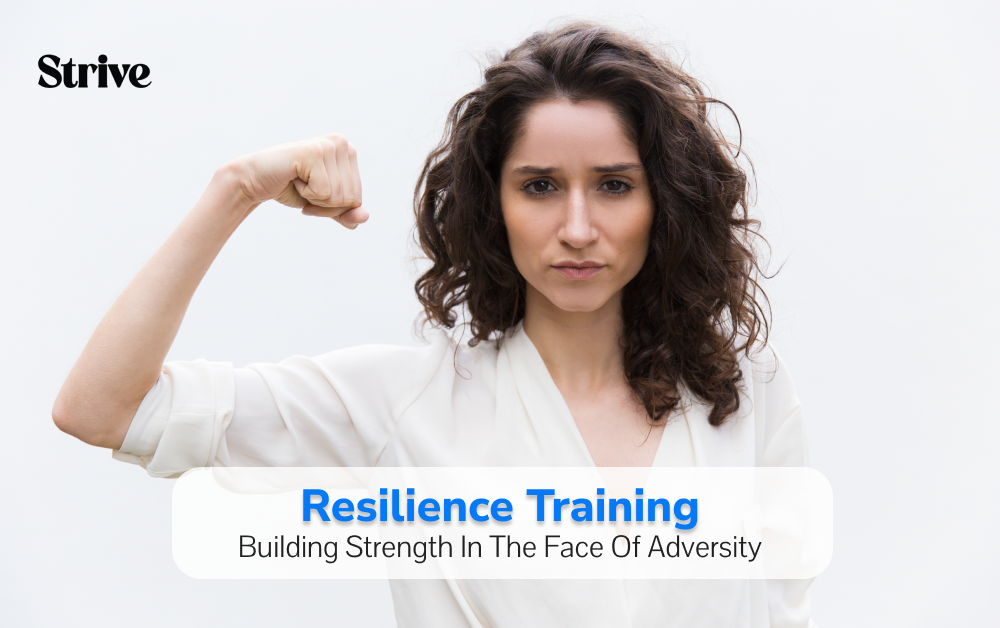What if you could develop the inner strength to navigate life’s challenges with unwavering determination and bounce back from setbacks stronger than ever? Is resilience a skill that can be cultivated and strengthened?
In today’s fast-paced world, where unexpected events and personal setbacks are a part of life, resilience has become a sought-after quality. Resilience is the ability to adapt, recover, and thrive in the face of adversity. It equips individuals with the mental and emotional resilience to overcome obstacles and emerge stronger on the other side.
Resilience training offers a pathway to develop this remarkable skill. By understanding the principles and techniques of resilience, individuals can enhance their ability to weather storms and come out on top. Through resilience training courses, workshops, and programs, individuals can acquire the necessary skills to build resilience and face life’s challenges head-on.
So, how can resilience training empower you to navigate life’s ups and downs? Let’s explore the power of resilience and discover practical strategies to cultivate resilience in your life.

Key Takeaways:
- Resilience is the ability to adapt, recover, and thrive in the face of adversity.
- Resilience training enables individuals to develop the inner strength to overcome challenges.
- Resilience training courses, workshops, and programs offer practical strategies to build resilience.
- Resilience training empowers individuals to navigate life’s ups and downs with unwavering determination.
- Cultivating resilience is a personal journey, and seeking professional support can be beneficial.
The Power of Resilience
Resilience is a remarkable quality with the transformative power to fuel determination, courage, and resourcefulness in the face of adversity. It empowers individuals to rise above their circumstances, maintain focus, and forge ahead, even when hope seems lost. Resilience is not about suppressing emotions or denying the challenges; instead, it is about embracing them and finding ways to adapt and thrive.
Developing emotional resilience and mental resilience equips individuals with the inner strength to navigate life’s obstacles and setbacks with resilience skills that can be cultivated and strengthened. Resilience training provides individuals with the tools and strategies to bounce back from difficult experiences, build coping mechanisms, and maintain a positive outlook on life.
“Resilience is not just about bouncing back; it’s about bouncing forward and using adversity as a catalyst for growth.” – Dr. Kim Robertson
Throughout history, individuals who have demonstrated resilience have overcome seemingly insurmountable challenges to achieve great success. Whether it’s athletes achieving extraordinary feats, entrepreneurs building thriving businesses from the ground up, or individuals facing personal hardships and finding the strength to not only survive but thrive, resilience has proven to be a powerful force.
By developing resilience, individuals can cultivate the ability to adapt to changing circumstances, embrace challenges as opportunities for growth, and maintain a positive mindset even in the face of adversity. Resilience is a skill that can be learned, honed, and applied to all areas of life, from personal relationships to professional endeavors.
Understanding Emotional Resilience and Mental Resilience
Emotional resilience refers to an individual’s ability to cope with and adapt to emotional challenges, such as stress, grief, or trauma. It involves managing emotions effectively, maintaining emotional stability, and bouncing back from setbacks. Emotional resilience enables individuals to navigate difficult emotional experiences in a healthy and constructive manner.
Mental resilience, on the other hand, encompasses an individual’s ability to cope with and adapt to mental challenges, such as anxiety, depression, or major life changes. It involves developing a strong mindset, managing stress effectively, and maintaining mental well-being even in the face of adversity. Mental resilience enables individuals to navigate the complexities of their thoughts and emotions while maintaining mental stability.
Building Resilience Skills
Building resilience skills is an ongoing process that requires active participation and self-reflection. Here are some key strategies to develop and enhance resilience:
- Self-awareness: Take time to understand your emotions, strengths, and areas for growth. Recognize how you typically respond to adversity and identify areas where you can improve.
- Positive thinking: Cultivate a positive mindset and focus on the opportunities for growth and learning in every situation. Practice reframing challenges into opportunities.
- Goal setting: Set realistic goals and break them down into smaller, achievable steps. Celebrate each milestone along the way, fostering a sense of accomplishment and motivation.
- Building support networks: Surround yourself with positive and supportive individuals who uplift and encourage you. Seek out mentors, friends, and family members who can provide guidance and support during challenging times.
- Self-care: Prioritize self-care activities that recharge your physical, mental, and emotional well-being. Engage in activities like exercise, mindfulness, meditation, or hobbies that bring you joy and relaxation.
By developing these resilience skills, individuals become better equipped to face life’s challenges head-on, adapt to adversity, and thrive in all areas of their lives.
Resilience in Action: The Story of Maya Johnson
Maya Johnson, a graphic designer and entrepreneur, had always dreamed of starting her own design agency. However, when she launched her business, she faced numerous setbacks, including a lack of clients and financial struggles. Instead of giving up, Maya embraced these challenges as opportunities to improve and innovate.
Maya sought out resilience training and honed her business skills, seeking guidance and support from mentors and industry experts. Through grit, determination, and a resilient mindset, Maya overcame these obstacles, built a strong network of clients, and established a thriving design agency.
Maya’s story is a testament to the power of resilience and the ability to bounce back from setbacks. By developing resilience skills and embracing challenges, individuals like Maya can overcome adversity and achieve their goals.
| Benefits of Resilience Training | Examples |
|---|---|
| Enhanced problem-solving skills | Maya’s ability to think creatively and find innovative solutions to business challenges |
| Improved decision-making | Maya’s ability to make informed decisions under pressure |
| Increased adaptability | Maya’s willingness to pivot her business strategy and adapt to market changes |
| Greater confidence | Maya’s belief in her abilities and her resilience to overcome obstacles |
Resilience training can provide individuals with the tools and mindset needed to navigate life’s challenges with determination, courage, and resourcefulness. By developing resilience skills, individuals can embrace adversity, adapt to change, and thrive in all areas of their lives.
Cultivating Resilience
Resilience is a skill that can be cultivated and strengthened. Building resilience allows individuals to navigate life’s challenges with a sense of inner strength and adaptability. There are several effective ways to cultivate resilience in your life.
- Embrace challenges as opportunities for growth: Viewing challenges as learning experiences and temporary setbacks rather than insurmountable obstacles helps foster resilience. It opens doors for personal development and allows for valuable lessons to be learned along the way.
- Build supportive relationships: Surrounding yourself with people who uplift and encourage you is crucial for resilience building. Supportive relationships provide a network of emotional support and understanding during difficult times.
- Practice self-care: Engaging in activities that recharge your physical, mental, and emotional well-being is essential for developing resilience. This can include exercise, meditation, hobbies, or any other activities that bring you joy and relaxation.
- Maintain an optimistic outlook: Training your mind to stay positive and focus on the silver linings in challenging situations helps build resilience. By reframing negative thoughts and finding the positive aspects, you develop a resilient mindset.
- Set realistic goals: Breaking down your goals into achievable milestones keeps you motivated and on the path to resilience. Celebrating small successes along the way boosts confidence and reinforces your ability to overcome obstacles.
By incorporating these strategies into your life, you will gradually strengthen your resilience and develop the skills needed to thrive in the face of adversity.
Resilience Quotes:
“Resilience is not about avoiding adversity; it is about finding strength in the midst of it.”
“The human capacity for burden is like bamboo – far more flexible than you’d ever believe at first glance.”
Videos, Courses, and Workshops for Resilience Building:
| Video | Course | Workshop |
|---|---|---|
| Introduction to Resilience Building | Developing Resilience: Strengthening Your Inner Resilience | Building Resilience in the Workplace |
| Mastering Resilience: Overcoming Life’s Challenges | Resilience Skills for Personal Success | Resilience Building for Educators |
Resilience in Education
Resilience training can play a significant role in educational settings, equipping students with the skills and tools to navigate and overcome the challenges they may face. Whether it’s academic pressure, bullying, or personal setbacks, resilience programs and workshops provide students with the resilience training needed to bounce back from adversity, adapt to new circumstances, and thrive both academically and personally.
Developing resilience in students is essential for their overall well-being and success in the educational journey. Resilience training programs focus on building emotional strength, coping skills, and problem-solving abilities, empowering students to face challenges head-on and persevere even when faced with obstacles.
The Benefits of Resilience Programs in Education
Resilience programs in education offer a range of benefits for students, teachers, and the overall learning environment. These programs:
- Enhance students’ ability to manage stress and handle academic pressure effectively.
- Help students build healthy coping mechanisms to deal with personal setbacks or challenges.
- Promote positive mental health and emotional well-being in students.
- Equip students with problem-solving and decision-making skills.
- Improve students’ self-confidence and self-esteem.
- Facilitate a supportive and inclusive learning environment.
A Case Study: The Resilience Workshop at Anderson High School
To illustrate the impact of resilience workshops in educational settings, let’s take a look at the Resilience Workshop conducted at Anderson High School. The workshop, led by renowned resilience experts, focused on empowering students with resilience-building techniques and strategies.
“The resilience workshop at Anderson High School provided students with a safe space to explore their strengths, develop coping mechanisms, and cultivate an unwavering belief in their abilities. Through interactive activities, students learned how to bounce back from setbacks, adapt to change, and build a resilient mindset. This workshop not only equipped them with the tools for academic success but also fostered personal growth and well-being.”
As a result of the resilience workshop, Anderson High School observed a significant positive impact on students’ well-being, academic performance, and overall resilience. The workshop instilled a sense of empowerment and equipped students with valuable skills to face challenges head-on and thrive in all areas of their lives.
Comparison of Resilience Programs in Education
| Resilience Program | Features | Benefits |
|---|---|---|
| EmpowerEd | Interactive workshops, personalized coaching, collaborative projects |
|
| Resilience Builders | Online modules, peer support networks, mindfulness practices |
|
| Path to Resilience | Teacher-led activities, classroom discussions, goal-setting exercises |
|
These resilience programs provide a comprehensive approach to building resilience in students, empowering them to thrive in the face of challenges and adversity.
As seen in the image above, students actively participating in a resilience workshop are engrossed in various activities focused on building resilience skills.
The Relationship Between Resilience and Mental Health
Resilience and mental health are closely interconnected. Developing resilience can have a significant impact on an individual’s mental well-being.
Resilience training can help protect individuals from mental health conditions such as depression and anxiety. By building resilience, individuals develop coping mechanisms and skills to manage stress and overcome challenges. Resilience acts as a protective factor, reducing the risk of mental health issues and promoting mental well-being.
Furthermore, resilience plays a crucial role in helping individuals navigate traumatic experiences and stressful situations. When faced with adversity, individuals with higher levels of resilience are better equipped to cope, recover, and maintain a positive outlook.
“Resilience is not the absence of distress or difficulty. It is the ability to adapt, recover, and bounce back from adversity.” – Dr. Maya Richardson
Building resilience enables individuals to develop effective coping strategies, strengthen problem-solving skills, and cultivate a positive mindset. These attributes contribute to overall mental health and increase the ability to persevere through challenging times.
Image:
Enhancing resilience can also lead to improved self-esteem and greater life satisfaction. By building resilience, individuals gain the confidence and inner strength to overcome obstacles, adapt to change, and maintain emotional well-being.
Below is a summary of the relationship between resilience and mental health:
| Resilience | Mental Health |
|---|---|
| Protects against mental health conditions | Reduces the risk of depression and anxiety |
| Enhances stress management skills | Improves coping mechanisms |
| Facilitates recovery from trauma | Helps individuals bounce back from challenging situations |
| Promotes a positive mindset | Supports emotional well-being |
| Increases self-esteem | Enhances overall life satisfaction |
Tips to Enhance Resilience
Building and enhancing resilience is a valuable skill that can help individuals navigate life’s challenges with strength and determination. Here are some strategies and tips to enhance resilience and develop the necessary skills to bounce back and thrive:
- Build Strong Relationships: Cultivating strong and supportive relationships with loved ones and friends provides a vital support system during challenging times. Seeking comfort, advice, and understanding from trusted individuals can help build resilience and foster a sense of belonging.
- Engage in Meaningful Activities: Participating in activities that give a sense of success and purpose on a daily basis can contribute to resilience building. Engaging in hobbies, pursuing personal goals, or volunteering in the community can foster a sense of accomplishment and strengthen resilience.
- Learn from Past Experiences: Reflecting on past experiences and identifying coping strategies that have worked in the past can provide valuable insights for building resilience in the future. Understanding personal strengths and learning from past challenges can bolster resilience and provide a foundation for future success.
- Practice Self-Care: Taking care of oneself physically, mentally, and emotionally is crucial for enhancing resilience. Engaging in activities like exercise, meditation, and stress management techniques can promote emotional well-being and build resilience. Prioritizing self-care allows individuals to recharge and face difficulties with renewed strength.
- Maintain a Hopeful Attitude: Embracing a hopeful and positive outlook on life is essential for resilience building. Focusing on the future, setting realistic goals, and believing in one’s ability to overcome challenges can foster resilience and strengthen the ability to bounce back from setbacks.
- Take Action and Plan for Recovery: Rather than becoming overwhelmed by problems, taking action to address them and making a plan for recovery can lead to improved resilience. Breaking down challenges into manageable parts, setting achievable milestones, and taking consistent steps towards overcoming obstacles can enhance resilience and provide a sense of control.
By implementing these tips and strategies, individuals can enhance their resilience skills, overcome adversity, and thrive in all aspects of life.
The Role of Professional Support
While resilience training is a personal journey, seeking professional support can play a crucial role in enhancing resilience and overcoming challenges. When individuals feel they are not making progress or are uncertain about where to start, consulting with a mental health professional can provide valuable guidance, strategies, and personalized resilience training plans.
By working with a mental health professional, individuals can gain insights into their unique strengths and areas for growth. These professionals have the expertise to identify underlying factors that may hinder resilience development and offer evidence-based techniques to address them effectively.
Moreover, mental health professionals can provide a safe and non-judgmental space for individuals to express their thoughts and emotions openly. Through therapeutic interventions, individuals can explore and understand their reactions to adversity, learn healthy coping mechanisms, and develop a resilient mindset.
Seeking professional support can be a transformative step towards building resilience. Mental health professionals offer a wealth of knowledge and experience to help individuals navigate their challenges and cultivate a strong foundation for personal growth and well-being.
Furthermore, mental health professionals can help individuals develop practical skills that foster resilience in various areas of life. These skills may include stress management techniques, effective problem-solving strategies, and building healthy support networks.
Working with a mental health professional can also provide individuals with the opportunity to address underlying mental health concerns that may impact resilience. By addressing these concerns, individuals can develop a solid foundation for building resilience and ensure long-term well-being.
Professional support in resilience training offers a comprehensive approach to personal growth and transformation. Mental health professionals serve as trusted allies, providing valuable insights, support, and expertise to help individuals harness their inner strength and navigate life’s challenges with resilience and determination.
Benefits of Professional Support in Resilience Training
Here are some key benefits of seeking professional support:
- Expert guidance in developing personalized resilience training plans
- Insights into individual strengths and areas for growth
- Effective strategies to address barriers to resilience
- A safe and non-judgmental space to explore emotions and reactions
- Practical skills for stress management and problem-solving
- Addressing underlying mental health concerns
In summary, professional support is an invaluable resource for individuals seeking to enhance their resilience. By working with a mental health professional, individuals can gain the necessary tools, insights, and strategies to cultivate resilience and thrive in the face of adversity.

Virtual Adaptations of Resilience Training
With the increasing prevalence of online education and remote work, virtual adaptations of resilience training have become more relevant. Virtual resilience training can be delivered through various online platforms, such as Adobe Connect, Zoom, WebEx, or ClickMeeting. These platforms allow for interactive activities, engagement, and virtual interactions, ensuring participants’ active involvement in the training.
Virtual resilience training offers several advantages, including flexibility, accessibility, and cost-effectiveness. Participants can join training sessions from the comfort of their own homes or offices, eliminating the need for travel and reducing expenses. Additionally, virtual training platforms provide a wide range of tools and features that enhance learning and engagement.
Interactive exercises and simulations can be conducted virtually, allowing participants to practice resilience skills in a safe and controlled environment. Collaborative activities, group discussions, and breakout rooms can be easily facilitated, promoting interaction and knowledge sharing among participants.
Furthermore, virtual resilience training can be easily tailored to meet the specific needs and goals of different organizations or individuals. Training modules can be customized to address specific challenges or contexts, ensuring that participants receive targeted and relevant instruction.
Overall, virtual adaptations of resilience training offer a flexible and effective way to build resilience skills in the digital age. By harnessing the power of online platforms, individuals and organizations can benefit from immersive and engaging training experiences that foster personal growth and resilience.
The Impact of Resilience Training
Resilience training plays a crucial role in shaping individuals’ lives, enabling them to develop the necessary tools and skills to navigate challenges, overcome setbacks, and adapt to new situations. This training has a profound impact on various aspects of one’s life, including mental health, overall well-being, and outlook on life.
By participating in resilience training, individuals can enhance their ability to cope effectively with stress, adversity, and uncertainty. They learn valuable strategies and techniques that help them bounce back from difficult circumstances and turn setbacks into opportunities for growth.
One of the significant impacts of resilience training is its positive influence on mental health. Through the development of resilience skills, individuals can better manage stress, reduce the risk of mental health conditions like depression and anxiety, and improve their emotional well-being. Resilience training equips individuals with the tools to maintain a positive mindset, find meaning in adversity, and build inner strength to face life’s challenges.
“Resilience training is like a shield that empowers individuals to withstand the storms of life and emerge stronger than ever.”
Furthermore, resilience training fosters a sense of empowerment and self-efficacy. It helps individuals recognize their own strengths and abilities, enabling them to approach difficult situations with confidence and determination. By developing resilience, individuals become better equipped to take proactive steps towards personal growth and success, finding creative solutions and adapting to changes effectively.
Resilience training also has a profound impact on relationships and social connections. By cultivating resilience, individuals are better equipped to build and maintain supportive relationships, providing a strong network of social support during challenging times. Resilience training enhances communication skills, empathy, and understanding, allowing individuals to navigate conflicts and setbacks with resilience and compassion.
In conclusion, resilience training is a powerful tool that can positively transform individuals’ lives. It empowers individuals to cope with challenges, enhance mental health, and foster personal growth and well-being. By investing in resilience training, individuals can develop the inner strength and skills necessary to thrive in the face of adversity, ultimately leading to a more fulfilling and resilient life.
Conclusion
Resilience training is a valuable tool for developing the essential skills needed to navigate life’s challenges with strength and adaptability. By actively cultivating resilience, individuals can harness their determination, courage, and resourcefulness to rise above difficult circumstances and forge ahead towards success and well-being.
Resilience is not limited to specific contexts; it has a profound impact on both personal and professional aspects of life. By embracing resilience, individuals can bounce back stronger from setbacks, maintain focus, and thrive in all areas of their lives.
Through resilience training, individuals gain the inner strength and capacity to overcome adversity, adapt to change, and persevere in the face of obstacles. By developing resilience skills, individuals can become better equipped to cope with the uncertainties and challenges that life presents.
In essence, resilience training empowers individuals to develop the necessary tools and mindset to navigate life’s ups and downs with resilience, grace, and a positive outlook. By investing in resilience building, individuals can unlock their potential, embrace growth, and thrive in the face of adversity.
FAQ
What is resilience?
Can resilience be developed?
How can I cultivate resilience in my life?
Is resilience training beneficial in educational settings?
What is the relationship between resilience and mental health?
What are some tips to enhance resilience?
Should I seek professional support to enhance my resilience?
How can resilience training be adapted to virtual platforms?
What is the impact of resilience training?
How does resilience training assist in building strength and adaptability?
Source Links
- https://safesupportivelearning.ed.gov/sites/default/files/BuildResilToolkit-Mod-1-508.pdf
- https://www.mayoclinic.org/tests-procedures/resilience-training/in-depth/resilience/art-20046311
- https://www.linkedin.com/pulse/power-resilience-nurturing-strength-face-adversity-sahni








GIPHY App Key not set. Please check settings